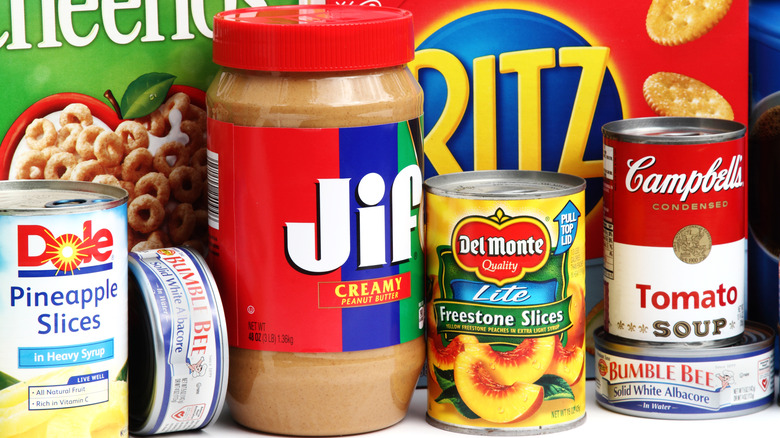How Much You Overspend When You Buy Name Vs. Generic Brand Grocery Items
When you're standing in the grocery store looking at an array of oat cereal, you'll probably be inclined to pick up the brand Cheerios, regardless of how much lower the price is of the Toasted O's sitting next to it. You can blame nostalgia, simple habit, or the marketing practice of placing costlier brands at eye level, but that brand name loyalty certainly has a pull.
Of course, buying groceries by name brand has an occasional benefit. Certain chip or soda brands might have a specific recipe that just isn't matched by any imitators. But if you're looking for a way to lower your grocery bill (and aren't we all), making the swap to generic brand items could reduce your spending by a huge amount, as most generic products are 40% cheaper on average than their name brand counterparts. Some estimates even place savings at around $500 a year on dinner ingredient shopping alone.
You won't be alone in making the switch. According to a study published by Circana, sales of private, non-name brands increased by 6% in 2023. Many consumers are specifically seeking out store-brand items for the flavor and quality rather than famous brands. After all, Trader Joe's rarely sells name-brand products, favoring its own, unique in-house items. Truly, your cereal might go down smoother if you feel like you've saved some money.
The case for generic groceries
Knowing that your grocery bill has the potential to drop 40% might be enough to convince you to make the switch. Or maybe you have some follow up questions. For many of us, the food we eat is a major part of our health and happiness, and it's worth spending a little extra to ensure that the flavor is up to our standards.
So, is buying generic baking soda going to ruin our cookies, or generic mayo going to ruin our sandwiches? The answer might depend on how advanced your taste buds are, but in general, no. In many cases, the generic brand is made by the same manufacturer as the name brand, although the formula may include lower cost or lower quality ingredients, or a slightly different recipe.
If you're struggling with whether or not to make the switch, some people recommend doing a blind taste test of the store brand product and the name brand you're used to. If you can tell a difference, it might be worth investing in the higher quality one. But if not, you'll know for sure that the cost savings will benefit your budget without impacting your dining experience.
Milk, juice, spices, sugar, cooking oils, rice, and beans are just some of the items that are often said to be near the same regardless of brand. In general, if you're going to mix something into a batter or a sauce, the quality likely won't be as distinguishable as if you plan to eat it plain.

